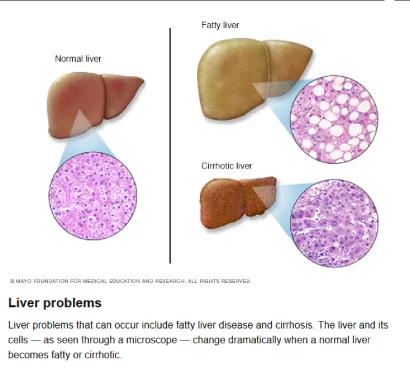What is Liver Disease?
Liver health indicator explains the underlying cause of Liver disease which can be inherited. But some liver diseases can be caused by a variety of factors that damage the liver, such as viruses, alcohol use and obesity.
Your liver is the second largest organ in your body and it helps process nutrients from food and drinks and filters harmful substances from your blood. It is located under your rib cage on the right side of your abdomen. The liver is essential for digesting food and removing all the toxic substances from your body.
In time, conditions that damage the liver can lead to cirrhosis and liver failure which is a life-threatening condition. But early treatment will give the liver time to heal. The functions of the Liver are as follows:
- removing toxins from your blood
- converting nutrients from the foods you eat
- storing minerals and vitamins
- regulating blood clotting
- producing cholesterol, proteins, enzymes, and bile
- making factors that fight infection
- removing bacteria from your blood
- processing substances that could harm your body
- maintaining hormone balances
- regulating blood sugar levels
Once the Liver is damaged they lose the ability to perform the above functions. Liver Problems can make a person very sick and can even be life-threatening.

Preventive Heart Checkup
Cancer Screening Package
Kidney Health Screening
Liver Health Screening
Health Atmos provides quick & quality Executive Health Checkup, Annual Health Screening Package and Preventive Health Checkup that are affordable & cost-effective.
What are the Symptoms of Liver Disease?
Liver disease can easily go unnoticed until the symptoms become severe. The following symptoms are signs that you might be developing Liver disease:
- Skin and eyes that appear yellowish (jaundice)
- Abdominal pain and swelling
- Swelling in the legs and ankles
- Itchy skin
- Dark urine color
- Pale stool color
- Chronic fatigue
- Nausea or vomiting
- Loss of appetite
- Tendency to bruise easily
What are the Causes of Liver Disease?
Infection
When Parasites and viruses infect the liver, it causes inflammations which reduce the functions of the liver. The virus that causes liver damage is spread through blood or semen, contaminated food or water, or close contact with a person who is infected. The common types of liver infection are hepatitis viruses, such as:
- Hepatitis A
- Hepatitis B
- Hepatitis C
HEPATITIS A VIRUS (HAV)
People develop hepatitis A infection after contracting HAV. This virus is transmitted by ingesting food or liquid contaminated with fecal matter containing the virus. Once transmitted, the virus spreads through the bloodstream to the liver, where it causes inflammation and swelling and the virus can survive in salt or fresh water and in ice cubes. A person comes in contact with HAV by
- Consuming uncooked seafood from water contaminated with human waste
- Having close physical contact with an infected person or sharing food or eating utensils with him
- Not washing hands thoroughly after using the toilet.
- Not washing hands thoroughly after changing an infected baby before preparing food.
HAV causes acute but usually not chronic illness. Generally, the body clears itself of the virus within weeks or months. There is no specific treatment, but adequate nutrition and rest is suggested. Alcohol and drugs that burden the liver, such as acetaminophen, should be avoided until a doctor determines that the liver is completely healed. A person who has had HAV will not get it again but can get other types of hepatitis. Vaccination prevents hepatitis A.
HEPATITIS B VIRUS (HBV)
HBV is present in the blood, semen, and vaginal fluids of an infected people. In case these fluids enter the body of someone who is not immune then the virus spreads. The virus is transmitted by
- Birth (from an infected mother to her baby).
- Dental, tattooing or body-piercing instruments that have not been properly sterilized.
- Shared hypodermic needles, razors, toothbrushes, nail files or clippers.
- Sexual activity
Health authorities believe that HBV is not spread by sharing food, drink and other eating utensils nor it is spread from coughing, holding hands, hugging, kissing on the cheek, breast-feeding. Adults who recover from acute HBV will then be immune to it. Small children are at high risk of developing chronic infection. Untreated, chronic hepatitis B will lead to liver failure and death. Vaccination prevents hepatitis B.
HEPATITIS C VIRUS (HCV)
HCV is transmitted the same way as HBV but most commonly through the injection of drugs with contaminated needles. There is no vaccine for hepatitis C
Immune system abnormality
Diseases where your immune system attacks certain parts of your body (autoimmune) can affect your liver. Examples of autoimmune liver diseases include:
- Autoimmune hepatitis
- Primary biliary cholangitis
- Primary sclerosing cholangitis
Genetics
An abnormal gene from one or both of your parents can cause various substances to build up in your liver, resulting in liver damage. Genetic liver diseases include:
- Hemochromatosis
- Wilson’s disease
- Alpha-1 antitrypsin deficiency
Cancer and other growths
Examples include:
- Liver cancer
- Bile duct cancer
- Liver adenoma
Others
Additional, common causes of liver disease include:
- Chronic alcohol abuse
- Accumulation of fat in the liver
- Certain prescription or over-the-counter medications
- Certain herbal compounds
What is the Risk Factor of Liver Disease?
Factors that increase your risk of liver disease include the following:
- Heavy alcohol use
- Obesity
- Type 2 diabetes
- Tattoos or body piercings
- Injecting drugs using shared needles
- Blood transfusion before 1992
- Exposure to other people’s blood and body fluids
- Unprotected sex
- Exposure to certain chemicals or toxins
- Family history of liver disease
*Complications of liver disease vary according to the cause of your liver problems. Untreated liver disease leads to liver failure and death.
What are the Preventive Measures for Liver Disease?
To prevent liver disease, you must:
- Drink alcohol in moderation – For healthy adults, one drink a day for women and two drinks a day for men because women have twice the risk of developing liver cirrhosis from alcoholic drinks compared to men.
- Avoid risky behavior – If you choose to have tattoos or body piercings ensure cleanliness and safety when selecting a shop. Seek help if you use illicit intravenous drugs, and never share needles to inject drugs.
- Get vaccinated – If you’re at increased risk of contracting hepatitis or if you had been infected with any form of the hepatitis virus, then hepatitis A and hepatitis B vaccine can be suggested for you.
- Use medications wisely – prescription and non-prescription drugs should be taken only when required and only in the recommended dosage. Don’t mix medications and alcohol. Consult your doctor before mixing herbal supplements or prescription or non-prescription drugs.
- Avoid contact with other people’s blood and body fluids – Hepatitis viruses are spread by accidental needle sticks or improper clean-up of blood or body fluids.
- Keep your food safe – Wash your hands thoroughly before eating or preparing foods. If traveling in a developing country, use bottled water to drink, wash your hands and brush your teeth.
- Take care with aerosol sprays – Make sure to use these products in a well-ventilated area, and wear a mask when spraying insecticides, fungicides, paint and other toxic chemicals. Always follow the manufacturer’s instructions.
- Protect your skin – When using insecticides and other toxic chemicals, wear gloves, long sleeves, a hat and a mask so that chemicals aren’t absorbed through your skin.
- Maintain a healthy weight – Obesity can lead to non-alcoholic fatty liver disease therefore weight has to be maintained.
You can book your health checkup by contacting Health Atmos. We cover all states in India and 25+ countries globally. You can choose a home collection service or walk-in appointment at a lab near you. We will be happy to be at your service. Stay Healthy! Stay Safe!


